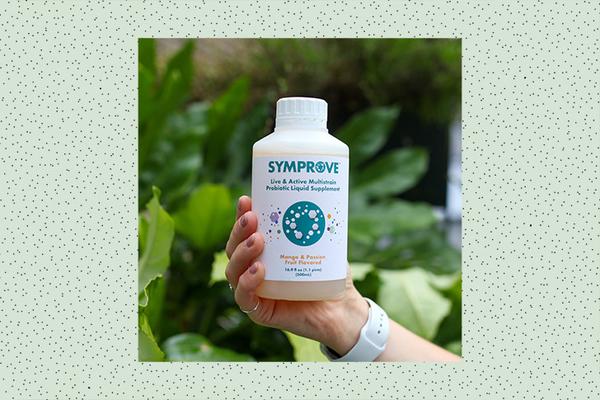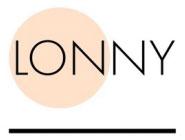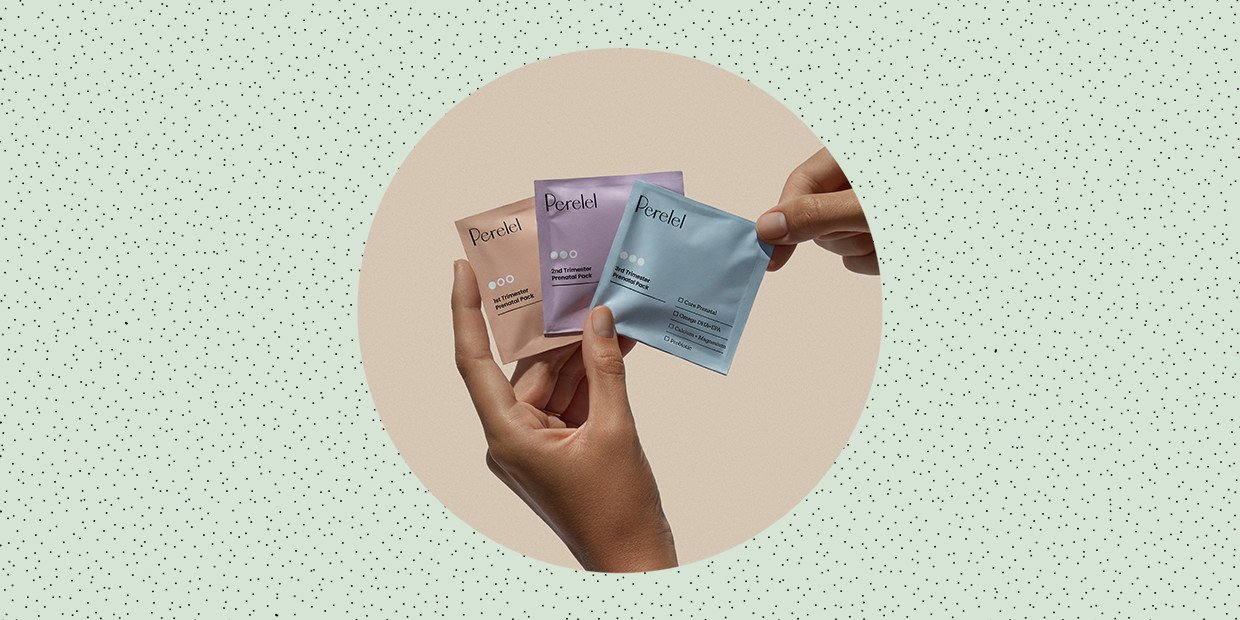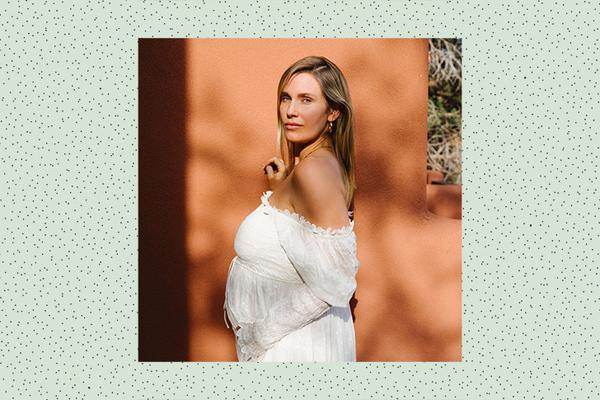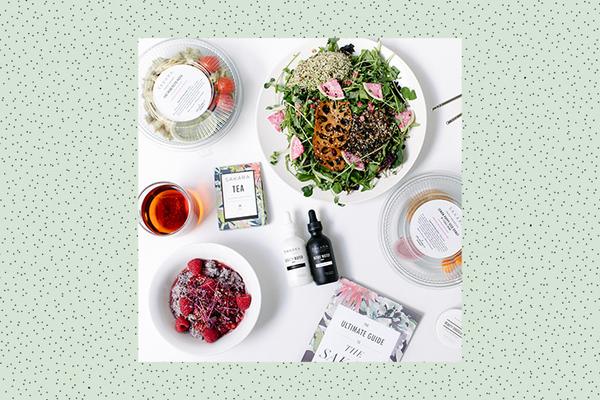Our idea of what is considered healthy has changed drastically over the years. As science has developed over time, humans have constantly adapted habits to improve our overall well-being. It doesn’t come that easily though. While it may take a while for people to accept that we should eat less meat and dairy, remember that just within the last century, people thought cigarettes and cocaine were good for you. It all takes a little bit of time for people to embrace new ideas.
We are still constantly learning, figuring out ways to optimize our bodies and eliminate exposure to toxins. However, when certain unhealthy products and habits are considered the norm, it takes thinking outside of the box, new perspectives, and innovation to break those cycles and provide better, safer alternatives for everyone.
Luckily, there are a few companies out there that are on their way to bring wellness to the world. With game-changing skincare formulas, supplements, and nutrition plans, these brands not only hope their products improve people’s health, but to also inform the world of how to live better lives. Read ahead as we chat with founders on how they’re bringing new energy and ideas to the wellness space.
Hugh & Grace
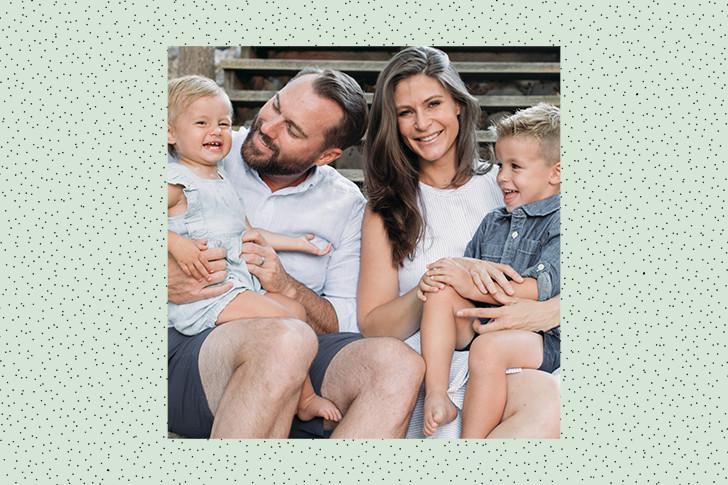
Hugh & Grace co-founders Ben & Sara Jensen; Courtesy of Hugh & Grace.Hugh & Grace is a hormone-safe self-care line focused on eliminating EDCs from common products.
Can you share your story about how you came to realize the effect of EDCs on your body and fertility?
Co-founders of Hugh & Grace, Ben & Sara Jensen: We spent 14 years struggling with unexplained infertility. We tried everything imaginable and spent all our savings on treatments and meeting with top doctors across the country. [We] did IVF, yoga, acupuncture, therapy. Nothing ever worked.
SJ: During one of our rounds of IVF, my doctor told me to avoid eating sweet potatoes, as they could have estrogenic effects and alter my hormones. At that point, I was getting my hormone levels checked almost daily and it caused us to think — if what we were eating could alter our hormones, what else could?
We started doing research and learned that Endocrine Disrupting Chemicals, or hormone disruptors, that are found in most skincare and personal-care products — including those that are labeled clean — are linked to infertility, as well as cancers, autism, obesity, Alzheimer’s, Parkinson’s, and many more diseases and disorders.
Incredibly, two of our family members — Ben’s sister and my sister —volunteered to be our surrogates and we now have our little miracles: Hugh and Grace.
How did you shift your habits to eliminate these toxins from your life?
BJ & SJ: We started slowly — and are still making changes! On a startup salary, we currently can’t afford to replace every product in our house. We evaluated which could best reduce our chemical exposure — skincare, cleaning supplies, laundry detergents — and replaced those. [We] are changing out some of our cookware as we can, [which is] still a work in progress.
We know that we can’t completely eliminate our exposure to hormone disruptors. But, we also know that small changes in our daily routines can lead to significant results in reducing the number of chemicals we are exposed to.
Hugh & Grace
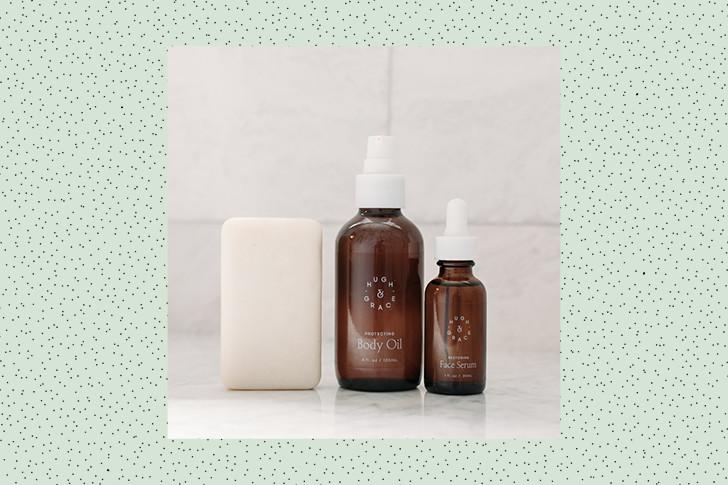
When did you first come up with the idea for Hugh and Grace?
BJ & SJ: When we first learned about hormone disruptors, we only associated them with infertility, and spent years conceptualizing a fertility-wellness company. As we continued to research, we saw study after study linking them to so many other serious diseases and disorders — a far broader problem than infertility alone.
Once we had our children, we committed to do something about it and spent over a year creating the brand. We worked with experts to create hormone-safe products formulated to help reduce chemical exposure and help people live cleaner, healthier lives.
What steps did you need to take to formulate your products without hormone impacting chemicals in an industry filled with them?
BJ & SJ: We traveled the country interviewing top formulators large and small, and ultimately found an award-winning partner with over 400 years of green-chemistry experience on their team to help us develop and formulate a line that was free from any known hormone disruptors, and yet still was high-performing, luxurious, and safe for the whole family to use. We also built a world-renowned advisory board of top doctors and experts from across the country to advise us and support us along the way.
Why did you choose this first few set of products to debut?
BJ & SJ: The topic of hormone disruption can be intimidating and overwhelming. There are over 1,000 known hormone disruptors, and we’ll never completely avoid them. We wanted to keep our offering simple and hopeful by launching with three products people use every day that can make an impact and can help reduce exposure.
Our products are designed to detox, repair, and protect to our bodies from chemicals and to build skin immunity and resiliency against them. Our launch products are a Restoring Face Serum, a Protecting Body Oil, and a Purifying Cleansing Bar. Individually and collectively, these products support the skin when its most susceptible to chemicals, as well as creating ease of entry into any person’s existing daily product routine.
How do you hope to see the Hugh & Grace brand grow in the next few years?
BJ & SJ: People talk a lot about “clean,” but you rarely hear about chemical exposure and almost no one talks about hormone disruptors in products. We are just now on the precipice of these topics becoming more broadly known.
Ultimately, we want to be the thought leaders in this space and provide meaningful, high-performing solutions. Whether it’s through the knowledge we provide, the products we sell, or the community we’re building, we want people to be able to turn to us as an authority on safe, thoughtful self-care.
Is there anything else you would like to share?
BJ & SJ: The only way we achieved our dream of having a family was by sharing our struggle and accepting help. The first 10 years of our infertility struggle we never told anyone about it — we were hurt, lost, and desperate. When we finally did, people showed us more love and compassion than we could have ever imagined. There’s strength when people come together to solve problems — miracles are created. After having our children, we felt responsible to share what we learned. We left our careers and went to work creating a solution.
We’re giving our all, but we recognize we cannot accomplish our mission without help. We developed our business model to welcome and support people who are passionate about our message and love our products — this is a personal message and needs to be shared word-of-mouth. Whether it be as an affiliate who spreads our message or an advocate who helps share and sell our products, our company is built to empower, reward, and support the individuals who drive our important mission forward.
Perelel
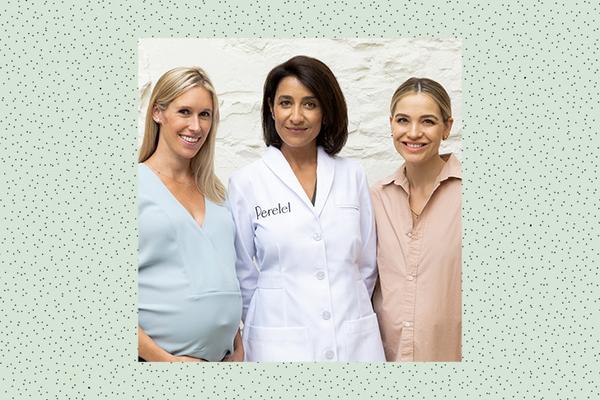
Perelel is a pre-and postnatal supplement line designed to fulfill needs at various stages of pregnancy.
What first led you to think of creating a brand like Perelel?
Co-founder of Perelel, Alex Taylor: We connected about two years ago and bonded immediately. When we met, we had both just given birth, and as two people with a lot of startup experience, we were disappointed by the way brands were connecting with us as new millennial moms. We began to get together regularly to discuss the market and quickly zeroed in on our shared frustrations with our prenatal vitamins and the surrounding experience.
After putting together the puzzle pieces of our challenges, Tori and I knew there had to be a better way to give moms and babies the nutrients they needed at the right time during pregnancy. Appreciating we weren’t MDs, we teamed up with Tori’s OB/GYN, Dr. Banafsheh Bayati, who eagerly validated our concept and joined as a medical co-founder.
We also ran the idea by a handful of other leading OB/GYNs and maternal fetal medicine doctors who were equally enthusiastic about the need for a more targeted prenatal vitamin with a holistic approach. From there, we knew were were onto something special, and so, Perelel was born.
What are some issues with prenatal and postnatal vitamins you recognized in your own pregnancy experiences? What changes did you realize needed to be made in the supplement industry for those who are pregnant?
Co-founder of Perelel, Victoria Thain Giola: Prenatals were top-of-mind for me given the birth of my daughter who was born with a cleft lip despite not having any risk factors or genetic link. It really knocked me off my feet, and I started looking for answers.
I did a lot of research with my OB/GYN Dr. Bayati, and learned that the type of cleft my daughter was born with is often associated with a folate deficiency. Shocked is an understatement. I had been taking a prenatal vitamin with folic acid, which I thought was the same thing as folate. I later learned that it is the synthetic version of the nutrient.
Some 60 percent of women cannot transform it into the absorbable format, known as folate. What’s more, I learned that folate levels during the first nine weeks of pregnancy are crucial to development. I was frustrated to find that so many prenatals had poor quality ingredients like folic acid, and saddened that there was so little education out there about what and when you really need in your prenatal.
AT: Meanwhile, I had also recently given birth to my first child and felt frustrated with my prenatal vitamin experience. I’ve always been incredibly health conscious, which was only magnified when I was diagnosed with a thyroid disease about seven years ago. I’ve been fortunate to have access to incredible practitioners over the years, so when it came to pregnancy, I was especially privy to the nuances associated with each phase. In a nutshell, I learned that the timing of certain nutrients was paramount.
When I began my pregnancy journey, I supplemented my prenatal vitamin with CoQ10 and additional folate while we were trying conceive. Once I finally got pregnant, I supplemented with added calcium and iron, and tracked down a separate Omega that offered both high-quality DHA and EPA, and so on. I was chasing down vitamins from Amazon, Whole Foods, you name it, piecing together what I understood to be the optimal mix. It was a haphazard experience to say the least. Each morning I’d line up my various pill bottles and sort out my daily dose, which my husband found very amusing.
What made things all the more confusing was the fact that there was very little credible information online about prenatal vitamin nutrition — nothing was standardized and most of the resources I found were on community forums, which just didn’t cut it.
What Tori and I began connecting about these issues, we found there were three major issues with the current one-size-fits-all prenatal vitamin market that we wanted to address: Poor quality ingredients, timing the introduction of certain ingredients was vital, and lack of information from credible sources.
Perelel
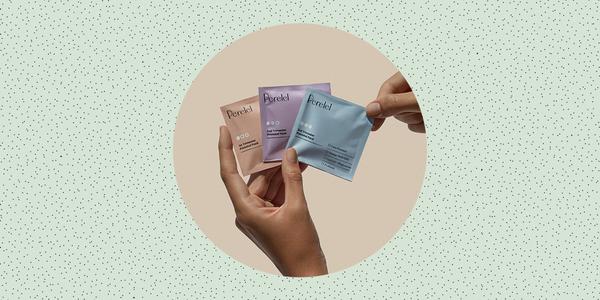
How did you begin developing your new products?
AT: Our co-founder and Tori’s OB/GYN, Dr. Bayati, helped us with the extensive research needed to understand what ingredients and nutrients we needed to make the highest quality products. We focused heavily on the exact development of the baby through each stage of pregnancy. These differ greatly, so working with Dr. Bayati to understand development phases and vitamins needed for each was paramount to us being able to begin to make our product.
We also engaged our Perelel Panel, our exclusive advisory team comprised of the nation’s top doctors and practitioners in pre- and postnatal health. Together, they worked closely with us to review our formulations and provide feedback relevant to their specialties.
Why is it important for people to take different kinds of supplements at different stages of pregnancy?
Co-founder of Perelel, Dr. Banafsheh Bayati: For many years, there has been an understanding that vitamins are all the same and can be “one size fits all.” But, as we know, every woman experiences pregnancy very differently and have completely different health needs and concerns.
For example, we always like to talk about how so many women experience extreme nausea early in pregnancy. This can make it difficult to eat, let alone take vitamins. With this information, we created a B6 and Ginger blend in the First Trimester Pack that can help alleviate that nausea, and also included other vitamins like [a] calcium and magnesium blend in later trimesters that would be hard to tolerate early on. Also, our packs include a base of just two additional supplements — folate and the B6 and Ginger blend — to cover their needs until they are able to handle the full pack.
How do you hope to see Perelel change the prenatal supplement industry?
AT & VTG: We hope that Perelel shows women that not only is tailoring your vitamins to each stage in your pregnancy important, but it is also accessible. We want to ensure that those who plan to have a baby, are pregnant, or who have had a baby, look to Perelel as the example for what women’s health and nutrition should be. No shortcuts — just great products and honest, helpful information from the best in their field.
Ultimately, we want to change the way that doctors and patients look at vitamins and supplements, and provide education for a widely unregulated industry.
How would you like to see the company grow in the upcoming years?
AT & VTG: Our goal is to be the gold standard for pre- and postnatal vitamins. Our hope is to make our products widely available to all mothers so that we can give them the peace of mind that they are getting exactly what they need, when they need it most during their motherhood journey.
We also aim to continue to expand our community and make sure that it is a reassuring and supportive network of experts, customers, and everyday people who find meaningful connections through their fertility experience, pregnancy, or early years of motherhood.
Is there anything else you would like to share?
AT & VTG: What really gets us excited is the mission behind Perelel. When we were building our company, we learned that one in 33 babies in the United States is born with a birth defect. We were shocked by this statistic and given Tori‘s experience, combined with our awareness of how nutrients impact maternal-fetal health, we knew we had to do something about it. And so, our mission became clear.
For every new subscription to Perelel, we donate a supply of our own prenatal vitamins to underserved women right here in the United States without access to high-quality prenatal care. Through Perelel, we believe we can help create a world with more healthy babies and more healthy moms.
Doing Well
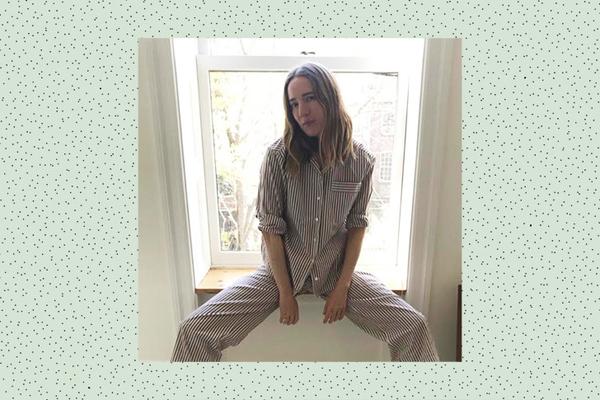
Doing Well is an integrative nutrition private practice run by Daphne Javitch.
Lonny: Can you share a little more about your path and how you found yourself working as a health educator?
Founder of Doing Well, Daphne Javitch: My own health challenges are what propelled me into this work. I struggled with debilitating period pain since age 13. In 2014, at 34, I was rushed to the ER because a cyst ruptured on my ovary. I was diagnosed with stage four Endometriosis. They discovered cysts all over both of my ovaries.
I decided to change my diet and lifestyle, and within six months I was pain free. I went from taking 12 Advil on the worst day of my period to none my entire cycle. My ongoing digestive issues also cleared up. I became fascinated and inspired and obsessed with learning and trying more and eventually that passion led to a professional leap.
What were some of the early things you put into place to keep you more connected and in tune with your body?
DJ: I loaded up on enzymatic and alkaline foods [like] lots of leafy greens and veggies. I introduced juices. I reduced all processed and packaged foods. I introduced healing tools on a regular basis like dry brushing, infrared sauna, and colonics. I began food combining. I continued to exercise and hydrate, but began to work on sleep routine and stress management. I was consistent — that was the biggest shift. Moving away from an all-or-nothing attitude towards a stable and sustainable routine.
For someone looking to be more aware of their health/body, what would you recommend starting with?
DJ: I’m a firm believer in the grandma principles of health! [Have] seven to nine hours of sleep, hydration, a diet of predominantly unprocessed, natural, single ingredient foods, regular exercise, stress management, and social connection. These are the foundational principles of healthy living. Choose one to three of them as a starting point and be consistent. When you’re ready, introduce more, and continue to deepen your practice.
Where do supplements fit into diet and lifestyle?
DJ: Supplements are an effective way to enhance a healthy lifestyle. They’re not cure-alls but can make noticeable improvements once the foundation is in place.
Doing Well
